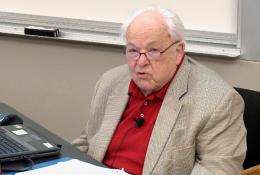New U.S. nuclear reactors unlikely soon: physicist

(PhysOrg.com) -- Japanese officials increased the nuclear crisis level at the Fukushima plant on Monday to match that of the 1986 Chernobyl disaster. But, unlike the Soviet disaster, most of the radiation from the Fukushima plant is spread locally, and that's an important distinction, said New York Times reporter Matthew Wald, who has written about energy for more than 30 years.
Wald, speaking at Stanford this week, said each explosion at the Japanese reactors released radiation, but the levels returned to their low background amounts afterward.
How will the catastrophe in Japan affect the construction of new reactors here? The American public may be wary of nuclear energy for now, but ultimately the approval of new plants depends on community support, not national sentiment, Wald said.
The journalist has toured more than 24 nuclear reactors, recently visiting one in Maine that was torn down for safety reasons. Teachers at a school across the bay from the plant were worried about the building that will replace it, he said. They liked the nuclear plant because it was quiet and didn't disrupt their school.
Wald spoke during a weekly Energy Seminar series sponsored by the Woods Institute for the Environment and the Precourt Institute for Energy.
The future of nuclear energy in the United States comes down to profit, Wald says. Other forms of energy, especially natural gas, are cheaper than building a new nuclear plant. "I don't foresee any more reactors getting built here," he said.
U.S. energy demand has shrunk over the past two years, but demand is high in China and India – countries that Wald predicts will resume construction of nuclear reactors because they have limited access to coal.
Another speaker at the energy seminar, Burton Richter, noted that nuclear safety improved after the historic disasters at Three Mile Island and Chernobyl. Richter, a 1976 Nobel laureate in physics, is a former director of the SLAC National Accelerator Laboratory and an energy policy expert.
The 9/11 attacks on the World Trade Center sparked further strengthening of security at U.S. nuclear power plants, he added. Richter expects similar safety reviews by the U.S. Nuclear Regulatory Commission following the Fukushima accident.
The NRC is the "gold standard" for regulators, Richter said: "Even the French agree." France is home to one of the leading nuclear reactor manufacturers, and 80 percent of the country's energy comes from nuclear power.
Most of the 104 U.S. nuclear reactors are prepared for extreme events, including earthquakes, loss of power and the unwanted creation of explosive hydrogen, he said.
Richter acknowledged increased fears among the general public about nuclear energy, but said he expects Fukushima's worldwide impact to be small.
Provided by Stanford University

















